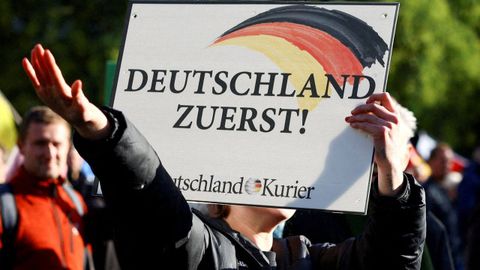
A supporter of the Alternative for Germany (AfD) party salutes Hitler during a protest against the government. CHRISTIAN MANG | Reuters
Alternative for Germany is the second political force in the country, behind the conservatives from the CDU
The far-right Alternative for Germany (AfD) shocked the other parties on Friday by becoming the second political force in the country and clearly ahead of the ruling Social Democracy (SPD), which it overtook by two points. A periodic poll by Germany’s first public broadcaster ARD Deutschlandtrend, something like trends in Germany, reveals this Friday that the AfD would get 19% of the vote in the general elections scheduled for this Sunday, the highest ever achieved by the ultra-nationalists in the channel’s polls. Three weeks ago, the AfD already managed to link the electoral intentions with the SPD of Federal Chancellor Olaf Scholz.
The force with the most votes in a hypothetical electoral advance would still be the current conservative opposition, the Christian Democratic Union (CDU), with a stable 29% of the potential vote. While the far-right AfD managed to add one point compared to the previous poll, the Social Democrats lost it and now have 17 percent. The Greens repeat the electoral support of 15 percent, while the Liberals (FDP) also drop by one point and would fall to 6 percent. These last three formations, which form the tripartite coalition that governs the country, would not now have a sufficient parliamentary majority to remain in power. The situation of La Izquierde, the successor of East German post-communism, which would lose its representation in the Bundestag with the intention of 4% of the votes, is also worrying.
The rise of ultra-nationalism has had no institutional consequences so far due to the isolation pact and strength maintained by other political formations. Even when there are runoffs for the election of mayors or district heads in Germany, the rest of the formations unite to prevent the triumph of the far-right candidate and support the opponent, regardless of their color. Last weekend in Schwerin, the capital of the state of Mecklenburg-Antepomerania, all formations, including the conservatives, called to support the Social Democratic candidate to prevent the city from getting an Alternative for Germany mayor. A course of action supported by 52% of Germans, according to Deutschlantrend, although 35% consider it wrong to marginalize ultranationalists in this way.
The heavy-hitting AfD has already reached 19 percent of the potential vote in a poll by the INSA institute published by Bild am Sonntag on Sunday, and analysts believe it is consolidating as a significant political force in Germany. The division within Berlin’s tripartite party and its difficulty selling voters on controversial decisions such as imposing green heating or controlled immigration to alleviate labor shortages is giving wings to the ultra-conservatives.
Federal Government Commissioner for Anti-Semitism, Felix Klein, is extremely concerned about the support that Alternative for Germany is recording, especially in the east of the country. “This shows dissatisfaction with political and social development much stronger than in the West“Warned Klein, who urgently needs to “better communicate the work of the Government in general”, as well as “make it clear to people that the populists have no answers” to the problems they face.
According to the CDU president, Friedrich Merz, the blame for the rise of the AfD lies with the executive power headed by Olaf Scholz. Part of the government is unable to register what the population thinks and “lost contact with citizens”, says Merz, who nevertheless admits that he would not now repeat his claim from four years ago that he would be able to “halve” the AfD’s popularity. “It was not a magic formula, but an assessment from four years ago,” admits the leader of the German conservatives.
In the AfD, however, they are jubilant. your president, Alice Weidel, confirms that his party is in the general elections in 2025 “will fight for power” and announces that he “wants” to go as a list holder and candidate for federal chancellor. “The polls make us tend to lead the executive branch,” Weidel said in a statement to the newspaper Die Weltin which he reveals that his formation will choose who will lead his election campaign at the 2024 congress.
Source: La Vozde Galicia
I am Amelia James, a passionate journalist with a deep-rooted interest in current affairs. I have more than five years of experience in the media industry, working both as an author and editor for 24 Instant News. My main focus lies in international news, particularly regional conflicts and political issues around the world.







